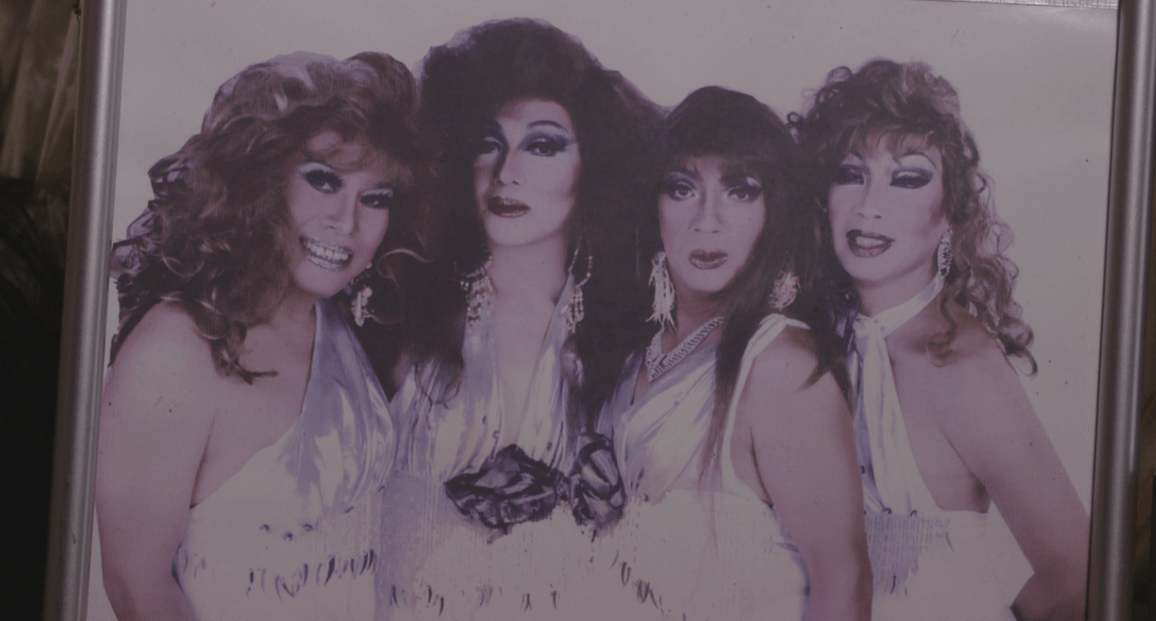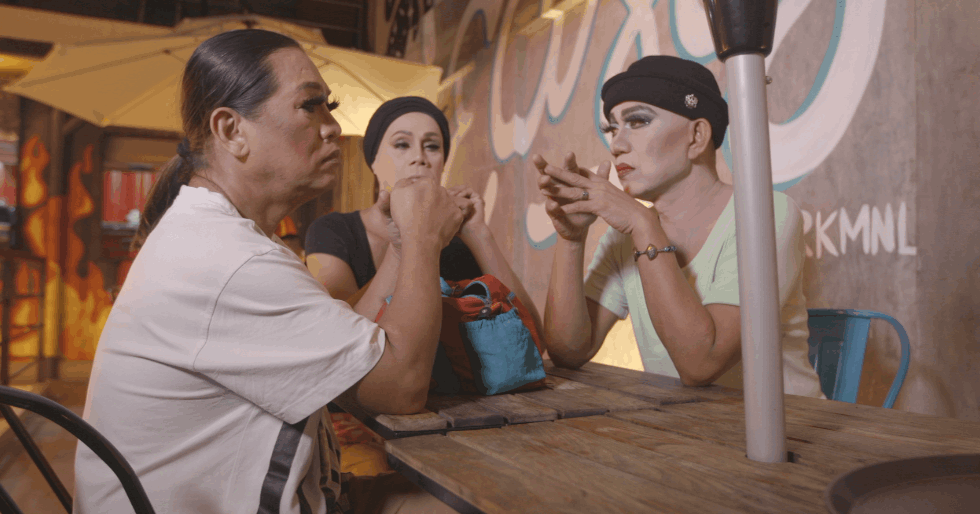Once upon a time,
the stage was their kingdom.
Queens of the Night
came out of the shadows,
shone brightly under the spotlight,
and found their place
in the Land of the Rising Sun.
MAMA-SAN MADE DREAMS COME TRUE, especially for Filipinos. If you could dance and sing, you've got a ticket out of poverty.
It was on everyone's lips: "Japan, Japan, sagot sa kahirapan."
("Japan, Japan, the solution to destitution.")
Some people may have turned their noses up at the idea of becoming Japayuki, but for this particular set of young men, that stage was the fulfillment of all their dreams.
They could make money doing something that usually earned them dirty looks and insults. They could wear the highest heels, put on the biggest hair, and add as much color to their face as they want.
They would even be able to afford to buy their own house because of these golden days.
But for drag queens Rico Medez Reyes (Elizabeth Oro Medez), Alfredo Alipao (Alfie Melon Moreno), and Flor Bien, Jr. (Amparo Dela Muñoz), the time they spent shining onstage and being treated like queens will always be their true treasure.

It was an exodus of sorts for these "men who are women at heart," as Amparo describes.
They became celebrities in their own right in Japan. They crooned their way to stardom and the flamboyance for which they were once shamed transformed into an asset.
Amparo recalls how, although the Japanese were impressed with their singing, what they really came for was the happy atmosphere that the gay shows provided. "Kahit na singer ka, kailangan mahusay ka ring magpatawa ," Amparo says. "Mas mabenta pa nga ang mga bading kaysa sa mga babae, kasi nga masiyahin."
("Even if you were a singer, you also needed to know how to be funny. In fact, customers would prefer gay men over women. Because we were funny.")
There, they found acceptance they could never quite find back home.
"'Yong father ko, galit talaga sa mga beki kasi ayaw niya ng malandi ayaw niya ng gano'n," Alfie says. "Galit na galit siya kapag may nakikita siyang beki. Naku, nagagalit siya."
("My father, he was angry at gay men, because he didn't like their garish displays of affection. He didn't like that. He would get furious at gay men. Really furious.")
THE STAGE BECAME THEIR REFUGE. Life in Japan wasn't all glitz. You don't stop working when you're sick, and they had to learn to do everything their own. Nonetheless, it was a space for them to be free.
"Ito 'yong passion ko, 'yong mag-entertain ng tao. Gusto ko 'yong matuwa sila," Alfie says.
("This is my passion: to entertain people. I want them to feel joy.")
"Feeling ko kapag nagpe-perform ako, 'pag lalabas ako sa stage, wala na akong pakialam e. Paglabas ko, ako naman. Ako naman ngayon. Stage ko na ito e. Kailangan i-enjoy mo 'yon," Amparo says.
("When I'm performing, when I'm about to go onstage... I stop caring about anything. When I go out there, it's about me. This time, it's about me. This is my stage. You have to enjoy that moment.")
Maintaining the sunny disposition their customers loved about them, the drag queens knew that the rainbow would not go on forever, and the pot of gold at the end would soon become empty. Soon enough, they were packing up the glitter and glam and they said goodbye to their life in Japan that had been filled with song and laughter.
Amparo is grateful to have been able to work there while the going was still good.
"As of now, napakahirap kasi kung drag queen ka. 'Yong kasalukuyang panahon, hindi ka makabuo ng dream mo. Noon, 'yong kasagsagan ng pag-ja-Japan namin, 'yan, nakapagpatayo ako ng maliit na bahay, natulungan ko 'yong mga pamangkin ko sa pag-aaral," Amparo says.
("It's harder now to be a drag queen. These days, you can't build a dream. Before, when employment in Japan was booming, I was able to build a home and I helped send my nieces and nephews to school.")
Alfie, meanwhile, couldn't help but be wistful about the good old days.
"Kung maibabalik ko lang uli 'yong biyahe namin sa Japan, mas gusto ko magtrabaho doon, kasi talagang tinuturing kaming artista, celebrity... parang tinitingala ng mga audience namin," Alfie says.
("If I could bring back our days in Japan... I liked the job there better. They treated us like artists, celebrities... it felt like the audience held us in high regard.")

"If I could bring back our days in Japan... I liked the job there better. They treated us like artists, celebrities... it felt like the audience held us in high regard."
ALFIE MELON MORENO
Alfredo Alipao
THE SOUL OF AN ENTERTAINER ALSO FILLS these "men who are women at heart. Now well into their 60s, these drag queens continue to do what they do best: bring joy to as many people as they can.
Alfie lives by it: No one is ever too old to be an entertainer.
"As long as kaya mo, as long as pinapalakpakan ka pa, go."
("As long as you can still do it, as long as there's still applause, go.")
"It's harder now to be a drag queen. These days, you can't build a dream. Before, when employment in Japan was booming, I was able to build a home and I helped send my nieces and nephews to school."
AMPARO DELA MUÑOZ
Flor Bien, Jr.
The three drag queens said they don't dream of bigger houses or more money. They've been performing together for decades now and they've grown to appreciate the company of good people and the support of their friends and family. All they want is to keep giving that positive energy back.
"Masaya ang feeling na nakakapagpasaya ka ng mga tao. Natutuwa sa'yo 'yong mga tao, ang sarap ng pakiramdam. Parang wala kang pagod. Hindi ka napapagod. Napapagod ka lang pagkatapos ng show," Alfie says.
("It's a great feeling when you make people happy. They feel joy around you and that makes you feel good. You don't grow weary. You only feel tired after the show.")
Elizabeth is happy to have the opportunity to wear dresses and to share her talent with people. Bringing them delight is a privilege she treasures.
For Amparo, the stage is sacred.
"Kailangan magmula 'yon sa puso mo e. Hindi lang sa puso, kasama ang isip mo dun e. Kung anuman ang gawin mo sa stage, damhin mo siya ng maayos. Pakita mo nang maayos, gawin mo siya nang maayos para masulit naman 'yong mga nakakapanood," Amparo says.
("It has to come from the heart. Not just the heart, you have to put your mind to it. Whatever you do onstage, you have to do it right. You have to do your best and give people their money's worth.")
In this GMA News and Public Affairs special, we see that there's never a dull moment in the life of these queens at heart.
They live to bring joy to a world that's unkind.